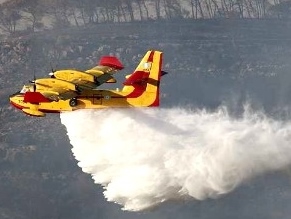|
World Jewish News

Greek firefighting aircraft dousing flames in the Carmel region of northern Israel, December 4, 2010. Photo by: Alon Ron (Haaretz.com)
|
Crippling Carmel blaze raises concern over Israel's ability to prevent disasters
06.12.2010, Israel Firefighters gained control over the Carmel blaze on Sunday afternoon, after four days of battling the flames that caused the deaths of 41 people - and three days before the state comptroller is expected to release a scathing report, revealing governmental lapses in the handling of firefighting preparedness.
The fire has also raised concerns within Israel over the government's lack of financial readiness to ward off other disasters.
Between three and five centimeters of rain fell on the region overnight and more was expected over the course of Monday. Fires were still blazing near Isfiya and Ein Hod Sunday night, but firefighters said they were under control. They will continue to work in the area for the next two days until the last of the fires is put out, the fire service said.
Chief firefighter Shimon Romach said Monday morning the change in weather would likely cut the amount of time his crew would need to be in the area.
The country's rescue services will decide Monday morning whether firefighting aircraft are still needed, and if it's possible to send home some of the people who have been fighting the fire.
Some 50,000 dunams (12,500 acres ) of forest land and 74 homes were burned down in the Carmel region. The thousands of residents evacuated in the last few days have been allowed to return home.
"The teams are dispersed in the field and are running around from one spot to another, in response to information from the command post and the drone," said Yosef Ben Yosef, who heads the Haifa Bay fire station.
"The way it looks right now, if we get through the night, we'll get a 'clean situation' assessment. There are still hot spots in the field, and we won't go until they are fully extinguished. I estimate that it will take 48 hours."
Most of the firefighting aircraft that other countries lent Israel have left the country, though Greek and Cypriot planes remain and could be put to use on Monday if deemed necessary.
"We're not leaving yet and not reducing our forces," said Ben Yosef. "We have learned that the wind can deceive us, and we don't want to draw hasty conclusions. We don't want surprises. It's better to make another small effort so that we get out of here calmly, in the end."
Yosef said the aircraft sent by other countries in response to Prime Minister Benjamin Netanyahu's call for assistance helped firefighters deal with the "complex topographical area of Mount Carmel."
"But there's no doubt that the work of the firefighters on the ground was essentially the 'last word' in the effort," he added.
State Comptroller Micha Lindenstrauss said Sunday he would not postpone the release of a report on the fire service that his office is now compiling, after Netanyahu asked him to expand the document to include a critique of the government's preparedness for the Carmel fire.
Lindenstrauss is expected to issue the report Wednesday, but is due to meet with staff in his office on Monday to discuss whether to undertake a separate investigation of the Carmel fire.
Some see Netanyahu's request as a way of providing the public with an investigation of the wildfire, without having to establish a commission of inquiry.
But sources in the premier's office said Netanyahu was just seeking an initial report, especially since the comptroller was already investigating the country's preparedness for dealing with fires.
"That doesn't mean there won't be an additional investigation in the future," one of the sources said.
The comptroller has already critiqued the state's fire preparedness, saying in a 2007 report that the fire service is the weakest of Israel's rescue forces.
Another report, issued early this year, stated that the situation of the fire service had significantly deteriorated in the time since the first report. Soon afterward, Interior Minister Eli Yishai initiated a cabinet resolution to inject more funding into the fire service.
The crippling blaze has highlighted the fact that Israel may not be financially ready to prevent natural or chemical disasters of other sorts.
For instance, the 2011 budget of the inter-ministerial steering committee that deals with earthquake preparedness is zero: There is no funding whatsoever, despite the fact that the committee submitted a request for money for, among other things, civil rescue units, a warning system, data collection, earthquake-risk assessments, and public education and information efforts.
A ministerial committee approved the budget, but the cabinet has yet to do so, so the committee in question will begin the new year with nothing.
Also, just as the inadequacies of the country's firefighting services were known to the country's leaders for years, so too are the lapses in aviation safety.
The December 2007 report by a committee appointed by then-Transportation Minister Shaul Mofaz and headed by former Israel Air Force Commander Amos Lapidot made 75 recommendations concerning correction of major problems in civil aviation safety.
Recent health ministry reports also find that Israel would be unable to prevent a potential epidemic and has found that Israel could still be left lacking hospital beds and doctors in the posited worst-case scenario - a quarter of the population (1.6 million people ) sick, 10,000 hospitalized and 2,900 dying.
Haaretz.com
|
|
